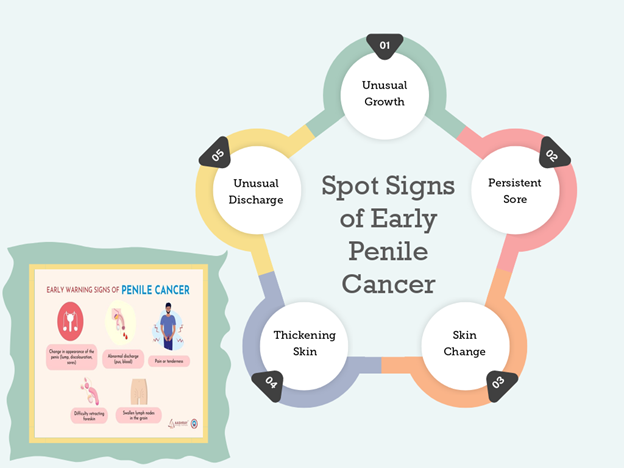Penile cancer is surrounded by misconceptions, leading to neglect and late detection. Knowing the causes of penile cancer improves prevention strategies. Awareness is key to early identification, enhancing survival rates. Here are ten often overlooked risk factors that could contribute to penile cancer development. Addressing these can aid in proper penile cancer prevention and timely intervention.
Understanding Penile Cancer and Its Lesser-Known Causes
Penile cancer remains a rare form of cancer that primarily affects men. However, its relative scarcity doesn't diminish its seriousness. Early identification of the early signs of penile cancer can substantially improve patient outcomes and penile cancer survival rates. Raising awareness about its risk factors is crucial for reducing incidence and severity.
Penile cancer in men is often under-discussed, leading to ignorance regarding its onset and potential penile cancer symptoms. While some causes are apparent, others are less visible. These hidden causes can easily be overlooked, contributing to diagnostic delays. Understanding these hidden risk factors is essential. By promoting penile cancer awareness and dispelling myths, you can take charge of your health. Being informed empowers you to seek timely medical input, ultimately improving penile cancer diagnosis rates.
Role of HPV and Hygiene in Penile Cancer Risk
Human papillomavirus (HPV) is a significant contributor to penile cancer risk factors. High-risk HPV types link to nearly half of all penile cancer cases. This virus is a significant concern for both men and women, affecting not only the genital area but also the throat and other regions.
Vaccination against HPV for young individuals plays an important role in penile cancer prevention. Maintaining sexual health through safe practices minimizes potential risk factors. Furthermore, personal hygiene is imperative, especially for uncircumcised men. For these men, the growth of bacteria under the foreskin increases cancer risk. Proper cleaning habits can mitigate this risk significantly.
- High-risk HPV types
- Importance of hygiene
- Vaccination's preventive role
Incorporating these preventive measures can drastically reduce penile cancer risk factors, paving the way for better penile cancer treatment options and outcomes.
Lifestyle Choices Like Smoking and Their Impact
Lifestyle choices heavily influence health outcomes. Smoking and various tobacco forms are linked with increased cancer risks, including penile cancer. Cigarette smoke contains carcinogens that contribute to cellular damage, leading to cancers.
Poor genital hygiene can lead to chronic irritation, further raising cancer odds. Moreover, smoking has a known association with compromised blood circulation, weakening immune defenses and potentially speeding up cancer progression. Adopting healthy habits like quitting smoking can significantly alter your risk landscape.
- Tobacco use consequences
- Poor hygiene effects
- Preventive lifestyle changes
Adjusting lifestyle habits can serve as a pivotal prevention strategy, offering tangible changes in potential penile cancer stages and outcomes.
Chronic Conditions and Immune System Challenges

Certain chronic conditions like buried penis and phimosis complicate personal hygiene, resulting in ongoing irritation. Skin diseases like psoriasis and others can lead to infections and prolonged inflammation, further increasing the cancer risk.
Additionally, suppressed immune systems due to diseases or medications diminish the body's natural defense against cancerous changes. This is often observed in individuals on long-term immunosuppressants, making them susceptible to various infections, including potentially serious ones.
- Chronic inflammation
- Immune system suppression
By recognizing the impact of these conditions on health, you can take steps to manage risk factors effectively.
Influence of Sexual Behaviors and Previous Treatments
Sexual behavior contributes immensely to penile cancer risk factors. High-risk practices, a greater number of partners, and early sexual activity amplify the likelihood of contracting HPV and other infections.
Previous treatments, such as PUVA, used for psoriasis, can increase cancer risk. PUVA is a photo-therapy treatment combining psoralen with ultraviolet A radiation, heightening sensitivity to light.
Halting such risky behaviors, promoting safety, and considering vaccinations can shield from potential cancer threats. Encouraging discussions around these preventive measures can also heighten penile cancer awareness in communities.
Empowering Prevention and Early Detection
Being proactive about hidden causes of penile cancer allows for timely intervention. Recognizing these less obvious risk factors empowers you to act on prevention strategies.
Engaging in regular self-exams, practicing good hygiene, and staying informed is crucial in recognizing the early signs of penile cancer. Open discussions with healthcare professionals about potential worries can lead to early penile cancer diagnosis and better management outcomes.
With the right combination of prevention, awareness, and quick response, penile cancer treatment options can improve significantly, enhancing overall well-being.
Take Charge of Your Health at Rajnish Hospitals
Penile cancer may be rare, but recognizing the signs early can make all the difference. At Rajnish Hospitals, our dedicated urologists offer expert care and personalized treatment plans for penile cancer.
If you’ve noticed symptoms or have concerns, don’t wait—schedule your consultation today. Early diagnosis is key to effective treatment. Let us guide you toward a healthier future!



